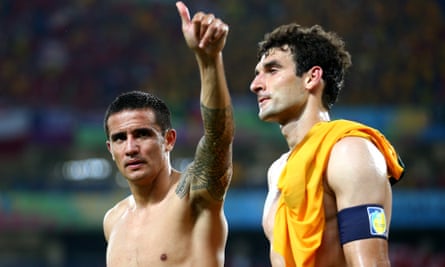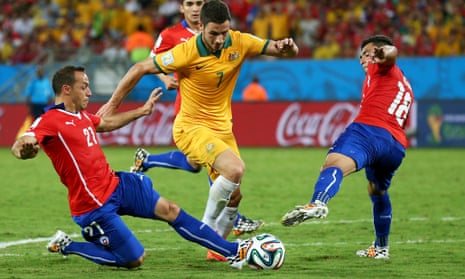The extravagant, whirligig personalities you find in football in other countries, the kind of loquacious carousers of the round ball town-square who are always going for the quip at all costs, don’t feature much in the Australian game. True to that character, there are no great personalities in this Australian side. The Socceroos aren’t big on larrikinism. The pranks they pull are pretty lame, and they don’t do comedy well – which is no great problem, when you consider that the prime minister, Anthony Abbott, is so good at supplying so many of the laughs on their behalf.
These Socceroos are sensible, focused athletes, and national recognition of the sport they play, while growing, is still comparatively slim. That lack of saturated media attention has its benefits, arguably providing a kind of unintended insulation against the megalomania that can form in the minds of some professionals in the other football codes. But mostly, it means that the team makes for pretty dull quote fodder: when you attend a Socceroos press conference, the players usually speak in the kind of flat, expressionless, vaguely distracted affect of 10-year-olds answering questions from their family dentist.
At the post-match press conference on Friday, Ange Postecoglou was true to type, bearing the droopy expression of a suburban plumber frustrated at an unproductive conversation with a parts supplier. But as the Socceroos filed through the media mixed zone in the moments after Postecoglou had finished talking, something different was in the air. Like their coach, the players were disappointed by the defeat to Chile; but more than that, they were angry. There was a jagged edge to the words, unusual for men whose answers normally wander off into a kind of mumbled, media-trained middle ground of rote, balanced optimism. Nothing summed up the mood in the camp better than the volley Tim Cahill, who speaks with greater authority than any other Socceroo, unleashed on the Chileans for “cheating” and shirt-pulling their way to victory. It was an extraordinary display of calculated verbal viciousness from a player whose obvious passion on the field has so often failed to last the journey beyond the sideline.
To be fair, by the gold standard of the Socceroos’ experiences of shirt-pulling in a World Cup group match, Chile wasn’t even half a Croatia. But Cahill’s actual words weren’t the point. The Socceroos weren’t just angry at the referee, or the Chileans; they were above all angry at themselves, because for long periods of the second half, as the men in red tired and Australia pressed forward in search of an equaliser, they knew the outcome of the match was within their control. Disappointment is an emotion played out in the key of acquiescence; anger is a call to action. Despite the obvious and widely proclaimed enormity of the obstacle before them, the Socceroos will travel to Porto Alegre with renewed belief in their ability to spring an upset.
The loss to Chile was heavily front-loaded; the whole game was shaped by the first 15 minutes. If the Chileans got a touch lucky for their first goal, a collection of bobbles and bounces in which knees and shoulders played a more significant role than feet, their second was unquestionably the result of poor defending, Eduardo Vargas selling three Socceroos defenders a dummy to leave Jorge Valdivia unmarked and with plenty of time to measure his precisely planted shot into the top left corner. The magnitude of the Socceroos’ resurgence from there was as great and surprising as the magnitude of their capitulation in the game’s opening stanza. It took 20 minutes but eventually the Socceroos settled into a momentum with a pleasingly defined identity, revolving around quick movement of the ball, the fearless running of Mathew Leckie, and Cahill’s unstinting appetite for the aerial fight. This was more than we were ever promised – or saw, for that matter – during the Holger Osieck or Pim Verbeek eras. With the team unquestionably improving from game to game over the last month and Postecoglou beginning to leave a firm stylistic imprint, at last the Socceroos are starting to play with the brio that Australia has always imagined itself – as a nation purveying a certain sense of the sporting style – to embody.

Luck will still play a big part from here, of course, and the Socceroos did not, as many had hoped, get lucky against Chile. But they did get Leckie, and in the powerful, direct running of the Socceroos’ triple-helping of a right winger, who with Cahill was the standout performer against Chile, there was something that seemed to rouse the whole team, stunned early on by the double-blow of Chile’s two goals, to attack. Leckie dragged his team-mates back to their senses, and his performance on Friday – as crow-eyed a tribute to the get-it-done spirit of no-bullshit Australiana as you’re ever likely to see in a gold jersey, regardless of the code – was the kind of thing that can make a career, not to say bring a flagging World Cup campaign back to life. Leckie, it’s worth noting, is almost the same height and weight as Brazil’s Hulk. And who is Hulk, really, but Brazil’s Mathew Leckie?
The FSV Frankfurt man, of course, is still only 23; his collaborator-in-chief on Friday, Ivan Franjic – now sadly ruled out of the tournament – is 26; and Jason Davidson, who capped a fine game on the left of the defence with a textbook sliding tackle to deny Mauricio Isla a clear shot on goal in the second half, is just 22. The excellence of these players on Friday provided vindication of Postecoglou’s faith in youth, and a firm basis for optimism about the Socceroos’ next phase of post-Brazil development, however important the contributions of Mark Bresciano and Cahill were on Friday and will continue to be over the next 10 days.
In a strange way, the team impressed as much by who didn’t play well as who did. On the left flank, Tommy was an oar in search of a rowboat, his manful, lungs-out early willingness to get in behind the famously defence-averse Chilean full-backs eventually dissipating into the fizzled anonymity of a couple of miscontrols and runs that no one playing in a gold shirt seemed much to want to feed the ball towards. In the absence of Robbie Kruse and Tom Rogic, Australian football’s genies-apparent, Oar has always figured as the one Socceroo likely to do something special in Brazil (something special on the field, that is; I don’t mean that he’s about to break into fluent Brazilian-Portuguese after half an hour on Duolingo, although that might be equally worthy of celebration if it does happen). The fact that he had such a quiet game against Chile offers some hope for the challenge that lies ahead against the Dutch. Either Oar will find his ocean, or exit this World Cup slowly dying under a fine rain of bad puns.
As the Socceroos filed past the media on Friday clutching their FFA-approved dinners, ready to board the flight back to their base camp in Vitoria, it was hard not to be left with the sense that these players, now convinced of their ability to compete against the best, will march into the game against Holland with rejuvenated self-belief. On present form the Dutch are the scariest team at the tournament; their front three of Wesley Sneijder, Arjen Robben, and Robin Van Persie presents the paradox of supplying both the World Cup’s most geriatric assembly of haircuts and its most youthfully incisive attacking force. But in tournament terms, the Socceroos are now exactly where they were after 20 minutes against Chile. The early anxiety has been shaken out. Confidence and determination are in abundant supply. And there was enough in the loss to Chile to suggest that, if they sort out their positioning and coordination in the centre of defence, start the game with less deference, and take their chances in the final third, they might just do a number on the moral now-world champions. That’s a lot of conditions to satisfy, of course. But no one ever said this would be easy. And on Friday night’s evidence, this is unquestionably a Socceroos team that likes it hard.

Comments (…)
Sign in or create your Guardian account to join the discussion